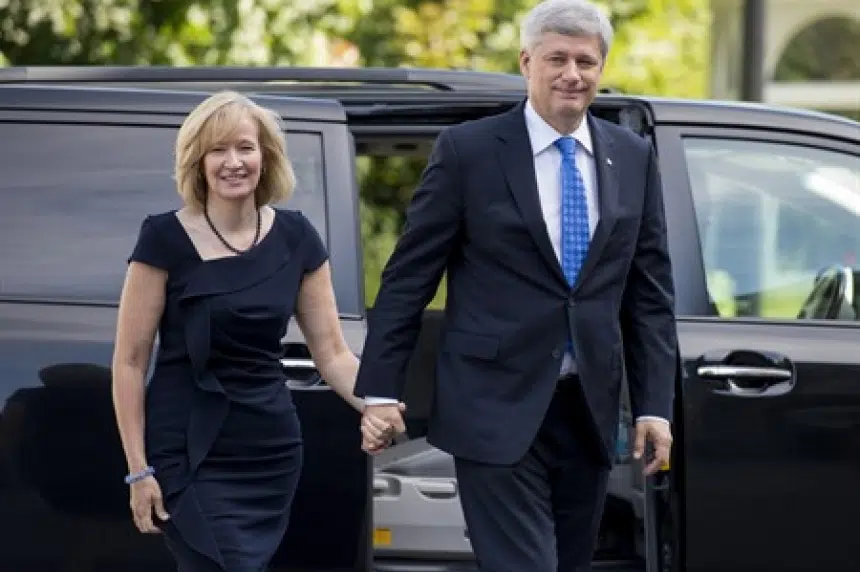Canada’s political leaders fired their opening salvos Sunday as Stephen Harper pulled the trigger on a marathon election battle that’s expected to rank among the longest, costliest and most caustic in the history of Confederation.
As holiday-weekend tourists swarmed Parliament Hill and blinding summer sunshine bathed Rideau Hall, Harper confirmed that Gov. Gen. David Johnston had dissolved Parliament, launching Canada’s longest election campaign since 1872.
A national election “is not a popularity contest,” Harper said, presumably referring to Liberal Leader Justin Trudeau, who must use the next 11 weeks — election day is Oct. 19 — to silence a persistent charge that he’s more sizzle than steak.
Across the Ottawa River in Gatineau, Que., with the emblematic Peace Tower looming in the distance, Mulcair — perhaps dwelling on the campaign’s history-making potential for the NDP — took a moment to gather himself before urging Canadians to put an end to nearly a decade of Conservative rule.
Middle class families “can’t get ahead” and Harper’s plan for the economy “isn’t working,” he said.
“I’ve fought for Canada my whole life,” Mulcair said.
“Together, we can leave to future generations a strong, united Canada that is more prosperous, more fair and that stands tall on the world stage.”
The Conservatives intend to grow the economy by making “wealthy people wealthier,” Trudeau said in Vancouver, following several hours of radio silence made necessary by a cross-Canada flight.
Trudeau looked relaxed as he predicted the election would ultimately be about which party can give middle-class Canadians a real and fair chance to succeed.
“My opponents can say whatever they like about me,” he said. “I’m going to stay focused on you, on making real change happen that will make a real difference in your life.”
Harper, who called the Oct. 19 vote a “critical decision” on the future of the country, tried to frame the ballot-box question as who should be in charge of managing the economy, creating jobs and overseeing national security.
Heading into the campaign, opinion polls suggest the Conservatives are lagging Mulcair and the NDP, with the Liberals running third. That means that for the first time since anyone can remember, all three main parties have a legitimate shot at forming a government.
And if Sunday was any indication, the road to victory in October will be paved with economic promise — particularly for working families and the shrinking middle class.
Harper touted his party’s economic record and “low-tax plan with disciplined financial management,” saying his rivals wanted “big hikes in spending to lead to permanent deficits as a way of dealing with temporary economic challenges.”
Not counting Sunday or election day, he has 77 days left to make that pitch resonate with voters — including many who were milling about the iconic Centre Block on Sunday, well aware of the country’s new election footing.
Harper may be over a barrel when it comes to the sinking price of oil, said Charlie Bjerrisgaard, who was visiting the capital from Keswick, Ont.
“Do I think Mulcair or Trudeau could do better? No,” Bjerrisgaard said. “It’s just the nature of the beast with the oil.”
Ottawa resident Deborah Andrews said voters will face a difficult decision when they go to the polls.
“There are challenges when you are making those choices,” she said. “I’ve been around long enough to know that campaign promises are just that, but I do know that if there is enough momentum you can institute change.”
The longest campaign in more than a century promises to be the most expensive ever.
Combined, the parties could each spend more than $53 million on their national campaigns, and candidates on average about $214,000 — more money than they’ve ever been able to spend before.
By way of its Fair Elections Act, the Conservative government increased spending limits — up from about $25 million for parties and $101,000 on average for candidates — for every day a campaign runs beyond the 37-day window.
In Sidney, B.C., Green party Leader Elizabeth May chastised Harper for an unfair system that will cost taxpayers “tens of millions of dollars” and give the Tories an unfair advantage.
Canadians “deserve MPs who put Parliament ahead of party” and can set aside “hyper-partisanship for citizenship,” May said.
In his own launch at Bloc Quebecois headquarters in Montreal, leader Gilles Duceppe reiterated his familiar promise to fight for Quebec’s interests in Ottawa, where he said the province has been ignored on critical issues including pipeline debates.
But to a person, all four challengers savaged Harper for calling the campaign so early. Harper said he did it to keep the other parties from currying favour with voters on the public dime.
It’s important “that the money come from the parties themselves, not from the government resources, parliamentary resources or taxpayer resources,” he said.
However, taxpayers will indeed be footing the bill for Elections Canada to staff a longer campaign, as well as paying for half of what the parties spend in the next 11 weeks, and up to 60 per cent of what candidates spend.
Yes, Harper admitted, the Conservatives are best-positioned to manage a campaign stretching nearly three months, because they have more money than anyone else.
That advantage exists “whether we call this campaign or not,” he said. Starting the campaign, he said, ensures each party plays by the same rules and isn’t “using taxpayers’ money directly.”
— With files from Kristy Kirkup in Ottawa, Gemma Karstens-Smith in Vancouver and Morgan Lowrie in Montreal











